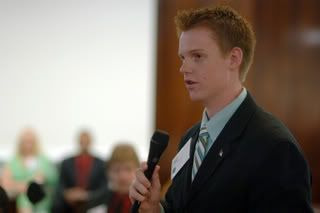Andrew McIndoe
Discussing, debating, and distributing my opinion on politics, public policy, and current events from a young conservative’s perspective.
Thursday, July 31, 2008
Remembering a Hero: Milton Friedman
Few men have had such a profound impact on the world’s economy as Milton Friedman. Though he passed away on November 16, 2006, he left behind an unparalleled legacy of freedom. Today, July 31, 2008 would have been his 96th birthday.
Despite this legacy, students today know little of Friedman’s accomplishments. His profound influence on economic policy is edged aside by politically correct curriculums that emphasize fringe groups and outmoded Marxist ideologies over common sense and sound economic theory.
Last year I attended a conference sponsored by Young America’s Foundation on Milton Friedman, organized in an attempt to balance this one-sided education. This three-day seminar focused on Friedman’s life and works, and it was here I gained a new appreciation of the twentieth century’s greatest economist and advocate of free markets.
As freedom-oriented organizations across the country like Young America’s Foundation today mark “Milton Friedman Day” with events and celebration, I am reminded of the lessons I learned.
Friedman spoke of the dangers of an intrusive government and the key role that a free competitive economy plays in making a free society possible. Not only is economic freedom an end in itself, Friedman rightly argued that it is also an indispensible means towards the achievement of political freedom.
He warned of the disastrous results that occur when government attempts to substitute its own judgment for the judgment of free people. Friedman asked in his famous book, Capitalism and Freedom: “How can we keep the government we create from becoming a Frankenstein that will destroy the very freedom we establish it to protect?” He had a vision of society where men and women are free to choose, but where government is not as free to override their decisions.
It is rare to find someone who has such a high level of intellectual brilliance in addition to common sense. Friedman demolished the ivory tower that used to be home to the study of economics and replaced it with the dinner table. Coauthored with his wife, Rose Friedman, he spread his ideas worldwide with Free to Choose, the best-selling nonfiction book of 1980 written to accompany a TV series on the Public Broadcasting System. Free to Choose made economic principles come alive as Friedman used his good nature and humor to present free market ideas in a way the general public easily understood.
“Nothing is so permanent as a temporary government program,” Friedman notably said. With the federal government the largest it has ever been (some studies estimate more than 14 million federal employees), Friedman recognized the harsh realities of uncontrollable bureaucracy and government spending. Always ready with a witty remark, Friedman concluded, “If you put the federal government in charge of the Sahara Desert, in 5 years there’d be a shortage of sand.”
We have a lot to be thankful for, courtesy of Milton Friedman. Including freer markets, an emergence of entrepreneurs, and his profound influence on leaders like Ronald Reagan. Without Friedman’s cultural influence, one must wonder if Ronald Reagan would have even been elected president. So, next time you engage in any economic activity, whether on Wall Street or Wal-Mart, be sure to thank one of my heroes, Milton Friedman.

